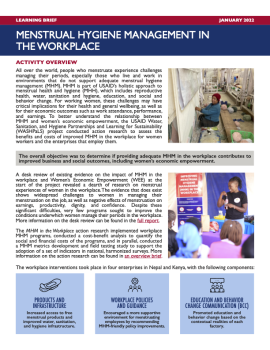Summary
USAID's Water, Sanitation, and Hygiene Partnerships and Learning for Sustainability (WASHPaLS) activity invested in action research in 2019-2022 to better understand the relationship between menstruation and women’s opportunities for economic empowerment and growth. Taking place in two factories in Nepal and two in Kenya, the action research took a multi-pronged approach. This learning brief highlights key findings and lessons learned from the interventions in Nepal and Kenya, makes recommendations for future menstrual health and hygiene (MHH) in the workplace activities and research, and lists possible future research priorities.


